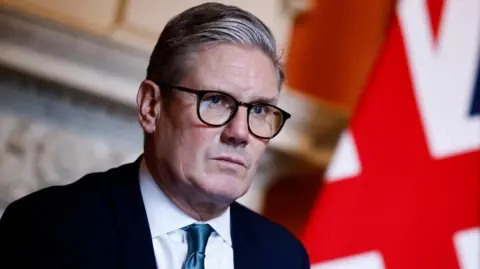Harry Farleypolitical correspondent, and
Jessica Rawnsley
Sir Keir Starmer is expected to announce the UK’s recognition of a Palestinian state in a statement on Sunday afternoon.
The prime minister said in July that the UK would shift its position unless Israel met several conditions, including agreeing to a ceasefire in the Gaza Strip and committing to a long-term peace process leading to a Palestinian state co-existing alongside Israel.
The Israeli leadership has ruled this out since the start of the war following Hamas’s attack in southern Israel on 7 October 2023 in which 1,200 people were killed and 251 taken hostage.
The PM’s move has drawn fierce criticism from the Israeli government, families of hostages held in Gaza and some Conservatives.
Israeli Prime Minister Benjamin Netanyahu previously said recognition of a Palestinian state “rewards terror”.
The decision to recognise a Palestinian state represents a major change in UK foreign policy, after successive governments said recognition should come as part of a peace process and at a time of maximum impact.
However, ministers argue there was a moral responsibility to act to keep hopes of a long-term peace alive.
Efforts to secure a ceasefire in Gaza – let alone a long-term solution to the Israel-Palestine conflict – have faltered. Israel sparked international outrage when it carried out an air strike on a Hamas negotiating team in Qatar.
Government sources said the situation on the ground had also worsened significantly in the last few weeks. They cited images showing starvation and violence in Gaza, which Sir Keir previously described as “intolerable”.
Israel’s latest ground operation in Gaza City, described by a UN official as “cataclysmic”, has forced hundreds of thousands of people to flee.
It is the latest Israeli offensive in the nearly two-year war which has seen much of the Palestinian territory’s population displaced, its infrastructure destroyed, and at least 65,208 people killed, according to Hamas-run health ministry figures.
Earlier this week, a United Nations commision of inquiry concluded Israel had committed genocide against Palestinians in Gaza, which Israel denounced as “distorted and false”.
Ministers have also highlighted the continued expansion of Israeli settlements in the occupied West Bank, which are illegal under international law, as a key factor in the decision to recognise Palestinian statehood.
Deputy Prime Minister David Lammy said “now is the time to stand up for” a two-state solution.
He told the BBC’s Sunday with Laura Kuenssberg: “Will this feed children? No, it won’t. That’s down to humanitarian aid. Will it free hostages? That must be down to a ceasefire.
“But does this mean that you get, or hold out for, that two-state solution and stand by the Palestinian cause being a just cause? That was the determination that I and the prime minister made at the end of July.”
Lammy said the timing of the recognition had been made “based on what’s happening on the ground”.
He cited the controversial E1 settlement project – which critics warn would put an end to hopes for a viable, contiguous Palestinian state – and the recent Israeli strike in Qatar.
 PA Media
PA MediaPalestinian Authority President Mahmoud Abbas welcomed the UK’s recognition pledge when he visited Sir Keir earlier this month, with Downing Street saying both leaders had agreed Hamas should play no role in the future governance of Palestine.
Husam Zomlot, its UK representative, told the BBC that recognition would mean “ending the denial of our existence” and that “the British people should celebrate today, when history is being corrected, when wrongs are being righted”.
“The question is never why should the UK recognise the state of Palestine,” Zomlot said, “the question is why didn’t the UK recognise the state of Palestine all along?”
He added: “Recognition is not a gift, it’s not a favour, it’s an inalienable right.”
Conservative shadow chancellor Mel Stride said he agreed with a two-state solution, but said recognising a Palestinian state now was “not applying any leverage or getting anything in return”.
He told the BBC: “It’s more to do with the internal politics of [the prime minister’s] own cabinet and his backbenchers and the pressure he is receiving, and that is not a good basis on which to conduct foreign policy.”
Meanwhile, in an open letter to Sir Keir on Saturday, family members of some of the hostages taken by Hamas urged the prime minister not to take the step until the 48 still in Gaza, of whom 20 are thought to still be alive, had been returned.
The announcement of the forthcoming recognition had “dramatically complicated efforts to bring home our loved ones”, they wrote. “Hamas has already celebrated the UK’s decision as a victory and reneged on a ceasefire deal.”
Asked about this, Lammy said he had been discussing the issue with relatives, adding: “I think it’s also right to say that there are many hostage families who are shocked and appalled that the prospects of a ceasefire have been set back just in the recent days.”
He also said it was important to recognise that “Hamas is not the Palestinian people”.
Sources in government said ministers will be setting out next steps for sanctioning the group in the coming weeks.
During a state visit to the UK this week, US President Donald Trump also said he disagreed with recognition.
Sir Keir had set a deadline of the UN General Assembly meeting, which takes place this week, for Israel to take “substantive steps to end the appalling situation in Gaza, agree to a ceasefire and commit to a long-term, sustainable peace, reviving the prospect of a two-state solution”.
He said in July: “With that solution now under threat, this is the moment to act.”
A number of other countries including Portugal, France, Canada and Australia have also said they will recognise a Palestinian state, while Spain, Ireland and Norway took the step last year.
Palestine is currently recognised by around 75% of the UN’s 193 member states, but has no internationally agreed boundaries, no capital and no army – making recognition largely symbolic.
The two-state solution refers to the creation of a Palestinian state in the West Bank and Gaza Strip, with East Jerusalem as its capital. Israel currently occupies both the West Bank and Gaza, meaning the Palestinian Authority is not in full control of its land or people.
Recognising a Palestinian state has long been a cause championed by many within the Labour Party. The PM has been under mounting pressure to take a tougher stance on Israel, particularly from MPs on the left of his party.
Shortly before he gave his speech in July, more than half of Labour MPs signed a letter calling for the government to immediately recognise a Palestinian state.
 EPA
EPAHowever, critics questioned why the government had appeared to put conditions on Israel but not Hamas.
Britain’s Chief Rabbi, Sir Ephraim Mirvis, called on the government to pause its decision.
“The intended recognition is not contingent upon a functioning or democratic Palestinian government, nor even upon the most basic commitment to a peaceful future,” he said.
“Astonishingly, it is not even conditional upon the release of the 48 hostages who remain in captivity.”
Government sources insisted their demands for Hamas to release the hostages and agree to a ceasefire had not changed.
But officials in the Foreign Office argued statehood was a right of the Palestinian people and could not be dependent on Hamas, which the government considers a terrorist organisation.




